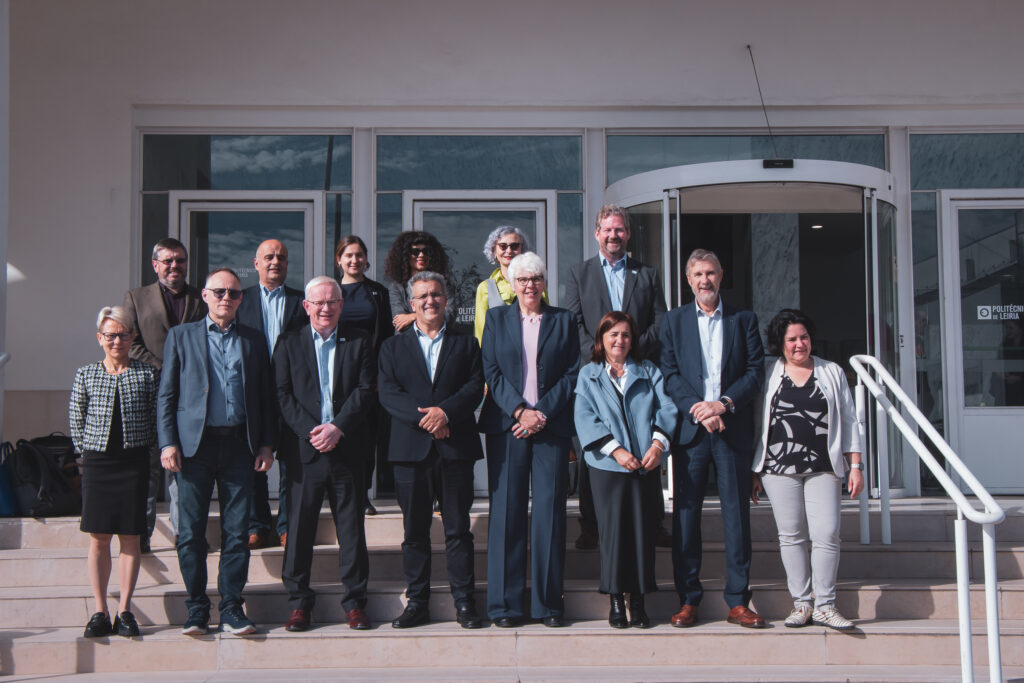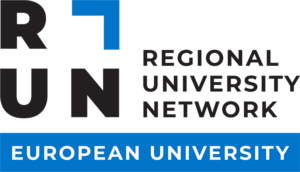International cooperation
RUN-EU . European University
The Polytechnic University of Leiria is part of an ambitious European alliance of higher education institutions: a European University focused on sustainable regional development.
Created within the framework of the European Universities Initiative and co-funded by the European Union, the Regional University Network – European University (RUN-EU) offers unique internationalisation opportunities for students, professors, researchers, technical staff and administrators through joint curricular programmes, exchange of experience and joint R&D+i initiatives in the context of international mobility and activities promoting interregional development in different European countries.
RUN-EU comprises eight higher education institutions from seven countries (Portugal, Spain, Ireland, Belgium, the Netherlands, Finland and Austria), covering all regions of Europe. Its strategy aims to revolutionise the quality and competitiveness of higher education and to promote European values.


This inter-university alliance aims to:
- enhance the quality, innovation and attractiveness of European higher education
- provide curricular programmes that enhance the skills needed for future professions.
- enhance the national and international competitiveness of the regions.
- promote sustainable economic, social, cultural and environmental development.
- be an active agent of social transformation in the regions, providing them with the necessary tools to address societal challenges.
To achieve these objectives, RUN-EU has since 2020:
- created 3 interregional research and innovation networks (European Innovation Hubs).
- set up 8 international R&D teams (Discovery Programme).
- developed an educational mobility strategy through inter-university academies for the creation and promotion of innovative learning opportunities, and has been responsible for the delivery of over 90 Short Advanced Programmes and 8 double degree courses.
In this second cycle (2024-2027), RUN-EU aims to deepen international cooperation within the Alliance and to integrate the European dimension into the activities of its member universities through the following priority objectives:
- enhancing their collective strengths in all areas of their mission, including education, research, innovation and service to society.
- the programmes of the Alliances should focus on the priority areas of the EU, including the digital and green transitions, as well as current and future socio-economic challenges.
- develop robust governance and management structures involving all stakeholders, including students.
- develop the legal status of their European University to award joint degrees based on the EU criteria for joint programmes.

The Future of RUN-EU
RUN-EU is currently in its second funding cycle, which runs from January 2024 to December 2027, with plans to consolidate activities and funding after this period. The Polytechnic University of Leiria will continue to develop and improve the legal status of the European University to award joint degrees following the European Union’s criteria for joint programmes and actively contribute to the development of the European Education Area in the field of higher education.
Team RUN-EU | Polytechnic University of Leiria
Coordination
The Polytechnic University of Leiria is the co-leader of RUN-EU, playing a central role in the management and governance structures of the Alliance, and sharing the responsibility of overseeing the achievement of the project’s objectives within the established timelines and budget.
The RUN-EU structure is divided into seven Work Packages (WPs):
WP1 – Coordination and Management
WP2 – RUN European Programme Academy (RUN-EPA)
WP3 – RUN European Research Area (RUN-ERA)
WP4 – RUN European Stakeholder Engagement Centre (RUN-ESEC)
WP5 – RUN-European Mobility and Innovation Centre (RUN-EMIC)
WP6 – RUN-EU governance, legal status, systems and sustainability
WP7 – Communication, dissemination and impact
WP6 and WP7 are led by the Polytechnic University of Leiria. Every WP has an internal leader who is the contact person for the other RUN-EU higher education institutions.
WP1 – Pedro Assunção | Clara Espírito Santo
WP2 – Marisa Dinis | Sandrina Milhano
WP3 – Marco Lemos | Maria Guarino | Diogo Monteiro
WP4 – Eduarda Fernandes | José Marques | Paulo Carvalho
WP5 – Dina Amaro | Clara Espírito Santo
WP6 – Pedro Assunção | Marisa Gomes
WP7 – João dos Santos | Rita Cordeiro
Management
In the co-leadership of RUN-EU, the Polytechnic University of Leiria is supported by four management bodies: the Governing Council, the Strategy Steering Group, the Executive Management Board and the RUN-EU Advisory Boards and Councils, which include the Student Council, the Staff Council and the Associated Partner Advisory Board.
In the second phase of RUN-EU, the Associated Partners of the Polytechnic University of Leiria are:
- NERLEI – Entrepreneurial Association of the Leiria Region
- AIRO – Business Association of the Western Region
- OesteCIM – Intermunicipal Community of the West
- CIMRL – Intermunicipal Community of the Leiria Region
- Speak – Share Your World
- Startup Leiria – Association for Entrepreneurship, Innovation and New Technologies
The Student Council is a consulting body of RUN-EU that assists the Executive Board in matters related to:
- student activities
- inclusion
- multiculturalism
- innovation in European mobility
- advanced Short Term Curriculum Programmes
- and European Double Degree Courses
All RUN-EU universities have a local Student Council. This Council meets regularly to review the strategy, results and impact of RUN-EU at a regional level and to make recommendations as necessary.
The eight Student Councils meet face-to-face once a year during Students’ Week, an event designed to promote the exchange of cultures and experiences among students in a multicultural environment.
Knowledge and research areas
RUN-EU promotes a true network of cooperation between higher education institutions, stimulating the production of knowledge and the development of joint projects in eight R&D areas:
- Creative Art, Design & Materials Thinking
- Food & Biotechnology
- Tourism
- IoT & Cybersecurity
- Smart, Sustainable & Advanced Manufacturing
- Climate Change – Circular Economy & Decarbonisation
- Education & Social Sciences
- Health & Wellbeing
The research activities of RUN-EU are organised in three interregional research and innovation networks dedicated to:
- Future Industries and Sustainable Regional Development
- Bioeconomy
- Social Innovation
As a European University, the promotion of international mobility of staff and researchers is also part of the short and long-term objectives.
